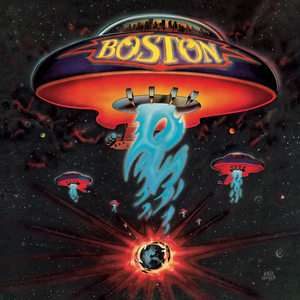 |
| Boston, by Boston. |
I was in high school in 1976 when I bought Boston’s famous debut album. That was a big year: it was the bicentennial of the United States, Jimmy Carter was elected president, Nadia Comaneci was earning 10s and then-Bruce Jenner won the decathlon in the Olympic games, much to my chagrin the Cincinnati Reds won the world series (but it wasn’t quite as exciting a series as the year before, which was the best world series ever), and the Apple Computer Company was formed by Steve Jobs and Steve Wozniak. My family moved from Fort Wayne, Indiana to Ashland, Ohio, and I spent the year playing tuba in the high school band, managing the high school baseball team, reading my first Isaac Asimov book, wondering if I should study physics in college, and listening to Chicago, the Eagles, Peter Frampton, the Wings, and Boston. The severe winter of 1976-1977 in northern Ohio and the simultaneous energy crisis resulted in my high school missing several weeks of classes, so some of my friends and I had time to establish our own garage band: “Hades.” We didn’t have a singer, and my role was to pick out the melody on an electric keyboard while the guitars and drums banged out behind me. Only a few years later disco music and the Bee Gees drove me from rock to country music, which I have listened to ever since.
My ears are still tingling a bit from the concert. How loud was it? Chapter 13 in the 5th edition of Intermediate Physics for Medicine and Biology discusses the decibel scale for measuring sound intensity, a logarithmic scale defined as log10(I/Io), where the sound intensity is
-->I and the reference Io is the minimum perceptible sound (10−12 W m−2). Table 13.1 in IPMB says 120 dB is the threshold for pain, and 130 dB is typical for the peak sound at a rock concert. Stephanie and I were sitting in the back of the amphitheater, so I doubt we ever experienced 130 dB, but we were up there pretty high on the decibel scale. I probably didn’t lose any hair cells in my cochlea (see Section 13.5), but I wonder how the band plays concerts night after night without suffering hearing loss. As people age, they tend to lose the ability to hear high tones: presbycusis. I may not have heard the music last night in the same way I heard it in 1976; some of those frequencies may be lost to me forever.
The leader of Boston is Tom Scholz, their 68-year-old guitar player and keyboardist. Scholz was educated as a mechanical engineer, and is one of the few rock musicians who might enjoy reading IPMB. I found that I could identify with Scholz in some respects: he is past his prime, no longer topping the charts or breaking new ground in rock and roll. But, after decades in the business, he’s still out there performing, playing his music, and even sometimes writing new songs. It makes me want to go write another paper!
 |
| My daughter Stephanie and I at a Boston concert at Freedom Hill Amphitheater in Sterling Heights, Michigan. |



No comments:
Post a Comment